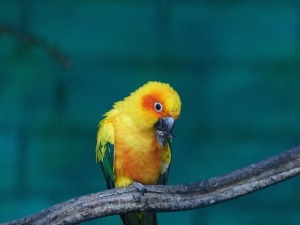
Your conure’s poop can tell you a lot about the health of your bird. If you’re used to your bird’s poop looking a certain way, and the bird’s poop suddenly changes in appearance, then you may have a problem on your hands.
This article looks into why your conure’s poop is watery.
Table of Contents
Conure poop watery:
If you’re used to your conure having poop that looks a certain way, and the bird’s poop starts to look very different than it normally does, if it starts looking watery, then the bird may have diarrhea or polyuria.
All birds, your conure included, will produce waste products that are made up of three parts, these three parts are mixed together in the bird’s cloaca before coming out all at once.
The three parts of the waste material that your bird will produce include the solid part, which is usually green or brown, the urates, which is the chalky white material that is a by-product of the bird’s kidneys, and, the bird’s urine, which is usually a very small part of the mixture, this is produced when the bird has excess water in its body.
The bird may produce watery poop in two scenarios:
Diarrhea:
If what is usually the solid part of conures bird’s poop, which is usually green or brown, has suddenly become more watery and isn’t solid anymore then this means that the bird has diarrhea.
Diarrhea happens when your bird’s usually solid poop becomes a soft formless mass.
Reasons why your conure may develop diarrhea may vary, the causes of diarrhea in your conure include bacteria, parasites, a nutritional deficiency, and the ingestion of toxic foods.
What to do:
If your conure does have diarrhea then giving the bird plain yogurt should help with this, plain yogurt is a digestive aid.
Closely monitor your bird as you give it the yogurt to see how it reacts to it.
Taking the bird to the vet is also recommended, this is especially true if the bird’s condition gets worse and/or if more symptoms develop along with diarrhea.
It is recommended that you take a stool sample from your bird and give this to the vet once you arrive.
Collect the stool sample by laying clean white paper towels at the bottom of your bird’s cage to catch the diarrhea.
The vet will use this to help diagnose the bird, the vet will also do a physical exam and tests to determine why your bird has diarrhea and to determine which medications to give the bird to treat the underlying condition that is causing your bird to have diarrhea.
Polyuria:
If your conure’s stool is still solid, but the bird has a lot of liquid around the poop, then the bird most likely has polyuria.
This condition can be confused with diarrhea but the difference between the two is that polyuria is the condition where the urine in the bird’s poop increases and the poop stays solid and diarrhea is the condition where the solid poop material becomes watery and formless.
Other signs of your bird having polyuria include ruffled feathers, anorexia, a loss of appetite, weakness, lethargy, vomiting, depression, blood in the stool, the bird tucking its head under its wing, and overall exhaustion from the bird.
There are a variety of reasons why your bird may have developed polyurea, these include a variety of illnesses, infections, different diseases, hormonal imbalances, poisons, toxins as well as something as simple as an increased amount of water being taken into the bird’s body through water-rich foods or water itself.
What to do:
Because there are so many reasons why your bird may have developed polyurea, it is recommended that you take the bird to the vet for an examination.
The vet can more quickly and more accurately determine the underlying cause of your bird’s polyuria.
Trying to figure out the underlying cause of this condition in your bird can be a long process and may not lead to finding the answer.
The vet will do a physical exam on the bird, will enquire about your bird’s eating habits, and, will run tests on the bird to determine what is wrong with the bird and what caused this condition.
The vet will then give the appropriate medications to the bird according to what the underlying reason behind the bird’s polyuria is.
Once medications are taken, and the underlying condition has been treated, your bird’s poop should go back to normal.
If you enjoyed this article then you may also be interested in other bird related articles. Here are some articles that you may be interested in: Why Is My Conure So Clingy?, Why Are Cockatoos So Loud?, Parrot Stomach Infection, How To Clean Cockatiel Tail Feathers, No Urates In Bird Poop, Cockatiel Feathers Turning Black, Conure Closing One Eye

